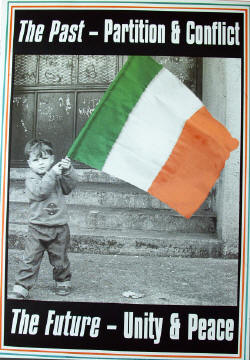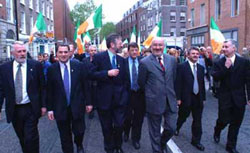 |
Irisch
Republikanische Solidarität
|
 |
CALLS FOR ELECTIONS AS IRA PUBLISHES STATEMENTS
"Hold the elections now and let the electorate have their say,"
Sinn Fein's Mitchel McLaughlin told a press conference in Belfast
today [Wednesday].
The Sinn Fein chairperson was speaking after the IRA released two
statements. "I think people will, given the history of politics
and conflict in this region will study very carefully indeed the
statements by the IRA and all the other protagonists and make a
judgement," said McLaughlin.
Calling for the reversal of the British government's decision to
cancel this month's election, McLaughlin asked "whose afraid of
politics and peace?"
The publication of the IRA statement of April 13, "now overtaken
by events" put on public record their statement to the British
and Irish governments intended as part of an over all initiative
towards full implementation of the Good Friday Agreement. In a
second statement dated May 6, the IRA commented on subsequent
events.
After receiving the April 13 statement, in what most republicans
see as an act in breach of trust and protocol, the British Prime
Minister, Tony Blair publicly called for clarification. According
to McLaughlin Sinn Fein responded to an invitation from the two
governments who said they would accept clarifications by Gerry
Adams.
"Tony Blair went further and said he did not care what form of
words were used," said McLaughlin.
Adams responded with specific reassurances but once again the
British government called for further clarification in relation
to alleged IRA activities. Adams gave a comprehensive response in
which he said that the IRA leadership "is determined that there
will be no activities which will undermine in any way the peace
process and the Good Friday Agreement."
"NO ACTIVITIES"
When Tony Blair rejected the statement and called for further
clarification, Adams responded curtly. "What part of 'no
activities' doesn't he understand," he said, as republicans
declared the paper chase over. Last week the British, acting
outside the Good Friday Agreement and against the wishes of the
Irish government cancelled the election and published the two
government's joint document.
"The IRA last night -- as you are aware -- made clear that Gerry
Adams's answers to Tony Blair's questions accurately reflected
their position and I think public opinion will share the view
that there is absolutely no lack of clarity in the IRA position
or its intentions," Mitchel McLaughlin told the media.
"The real problem as disclosed by Jeffrey Donaldson's very honest
and unambiguous answer is that the joint document would be
rejected by the Ulster Unionist Council and from that flows the
rest, the cancellation of the election and the removal of the
franchise," said McLaughlin.
Indeed, when announcing his decision to suspend elections, the
British Prime Minister acknowledged the real reason behind the
decision was a fear of anti-Agreement unionism and a desire to
save David Trimble from the ravages of his own party.
"The issue of the full implementation of the GFA goes to the core
of how we successfully bring forward conflict resolution
processes and embed the primacy of politics as well as the
practice of politics," said McLaughlin.
"And those that are retreating from that are quite clearly the
Unionist Party, the Ulster Unionist Council and unfortunately
they have been supported in this by the two governments. I think
the issue of how we can establish what the electorate make of all
of this would begin with the reversal of the decision to hold the
election," he said.
COMPLETE AND FINAL CLOSURE
Clearly the statement of April 13 represented a major initiative
by the IRA, despite the obvious conditionality of the British and
Irish government's Joint Document. Paragraph six makes clear the
IRA's support for the peace process and the following paragraph
expresses their desire to see the complete and final closure of
the conflict.
The statement spells out the IRA's view that the full and
irreversible implementation of the Good Friday Agreement and
other commitments such as addressing the issue of OTRs and
representation for Northern nationalists in Leinster House would
provide a context in which the IRA can proceed to definitively
set aside arms.
According to the May 6 statement the IRA was in the final stages
of carrying out a third act of putting arms beyond use when the
British government rejected the initial statement together with
subsequent clarification.
"In the event of agreement we were prepared to act immediately
and our preparations were at an advanced stage," said the IRA.
The April 13 statement repeats IRA reassurances to the unionist
community to whom they offer no threat and goes further by
recognising that the IRA does not fully understand unionist
perceptions and making a commitment to "listen and learn". The
statement also includes an apology to the friends and families of
non-combatants killed by the IRA.
BREACH OF PROTOCOL
Describing the April 13 statement as "overtaken by events" in
the
May 6 statement the IRA reiterated the leadership's commitment to
making the peace process work.
According to the IRA, after the initial statement was given to
the two governments on April 13, they described it as positive
and welcomed the obvious progress and said the statement showed a
clear desire to make the peace process work.
But ten days later, the British prime minister "in a clear breach
of protocol" publicly misquoted aspects of the IRA statement and
went on to pose three questions.
According to the IRA, Sinn Fein President Gerry Adams responded
in a clear and unambiguous way and "his answers accurately
reflected our own position," said the statement. The statement
rejects the British allegation of a lack of clarity and points
out that the subsequent "word game" caused justifiable anger
and
annoyance amongst republicans.
FLAWED DOCUMENT
Republicans have been further angered by the fact that despite
the clear flaws and limitations of the joint document offered by
the two governments, they had been prepared to accept the
document as part of a process to move forward and on that basis
had responded positively.
Last weekend's Sunday Business Post outlined many of the failings
of the document that are of concern to republicans and
nationalists. The SBP described the document as a "shoddy piece
of draftmanship, riddled with holes and ambiguities."
The document retrospectively legitimises Britain's four
suspensions of the North's institutions, all of which were
probably illegal under international law and definitely outside
the Good Friday Agreement.
It makes no provision for removing Britain's power to 'postpone'
elections and permits 'Irishness' to continue to be treated as a
second-class form of citizenship by the North's institutions.
It provides no protection for Irish citizens, their political
representatives or even the Irish government from British
securocrats and their continuing covert war. The document
contains no mechanisms to bring the British government to account
if it fails to meet its obligations or timetables. And it
contains no default procedure for full implementation of the Good
Friday Agreement in the event of further unionist intransigence.
"The British government is ducking the central issue," said
McLaughlin, "the issue is, are we going to embed politics or not,
are we going to allow people to vote or not, are we going to get
on with the political process or not."
"The evidence of last week which is indisputable, is that they
will put questions, they will be answered and then they will hit
you with another range of questions. Because they don't want to
knuckle down to the core issue which is we are entitled to
elections, it is time for an election, the electorate are
entitled to have their say. We are back to a 1969 scenario of
demanding the right to vote. They've taken away the right to vote
and republicans are justifiably angry with that," said
McLaughlin.
Letzte Änderung:
06-Sept-03